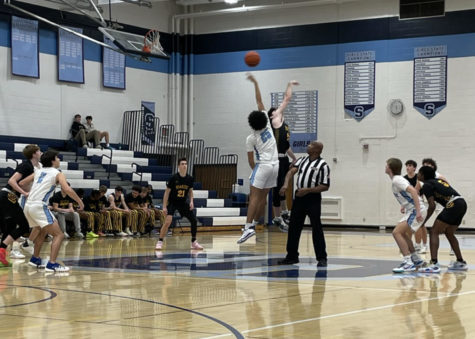Are You AP Material?
February 7, 2018
Yet again, it is course selection time, all too familiar to those years into it but still a fairly new experience for underclassmen. In homage to a great thinker: only you can prevent boredom/total burn out by tailoring your schedule to you. Neither I nor anyone else can tell you definitively what classes to take. However, it can’t hurt to know the philosophy of AP.
What are AP classes?
AP, or Advanced Placement, is a program created by the College Board, bringing the hard work and more expansive curriculum of college into your high school classroom. AP classes used to be only available by invitation, but now the sky is the limit. In brief terms, AP classes introduce you to higher-level learning and potentially qualify you for credits, as well as the ability to breeze through some introductory courses in college. And save you money.
They are no place for procrastination or unrealistic expectations–most honors AP courses are your first taste of the challenges beyond Shawnee. With that said, dedicated students will usually excel. If you truly feel you are up to the rigors of AP, never hesitate to challenge yourself.
Just get ready to have to actually read the textbook. While it’s still free.
What are the AP tests like?
Typically at least two to three hours long, the AP exams in early May are different from the SATs and other assessments you may have taken. Each one is scored out of five and costs around ninety-six dollars, with credits earned and advanced placement in college dependent on your score.
The classes are structured to prepare you for these exams. Most teachers devote a lot of time to review, so you’re fully equipped; for instance, in AP US History, you will practice the different types of writing examinations you will see on the test, like document-based essays and other short and long in-class writing assessments. In many classes, your regular tests will incorporate AP-style questions, and in lab sciences, labs will be derived from or direct versions of College Board labs. Outside of the classroom, the web offers a host of AP resources for the inquisitive student, and your local Barnes and Noble or public library has AP test review books.
Is AP actually a good preparation for college? How many classes should I take?
AP classes are a step beyond busy work and accommodating pacing. They are designed to forge critical thinkers, attentive listeners, and innovative people. Keep in mind that a laundry list of difficult courses will not get you into college–the verdict from college admissions officers is that they would rather see dedicated and consistent students than those spread too thin.
What is significant here is the kind of learning you are exposed to and the immersion into academics.
However, AP students do have a significant advantage in that they have proven to colleges that they can handle the responsibility of a collegiate workload. This is often the first step to getting your foot in the door to the more elite schools out there.
Taking even a few a year, although some especially high-achieving students take almost all AP when possible, will significantly boost your weighted GPA (if you can handle it). AP classes are kind of like lifting weights–if you work up to them and focus on technique, increasing their weight will help you build muscle. If you start too big and too heavy, they might be a destructive, rather than constructive, force. It’s all down to how you approach them.
What do AP students think of the classes?
“Take AP classes if you think your classes are easy and you get good grades with little stress,” says Margaret McDonald, junior. In the long run, it will benefit you more to challenge yourself than to avoid the risk.
“They’re more work than ACC classes,” says senior Sean Etter, “especially with the AP test. What I’ve enjoyed is the amount of information we learn over the course of the year; we typically go further than accelerated classes do.”
Elizabeth Speiser, a junior, says that challenging AP classes are the best exploration of topics you know you will enjoy. “I would not recommend taking AP classes that do not interest you,” she says, “because, without the enlightenment that comes with learning about something that is genuinely interesting, it will just be a lot of work for a lesser reward.”
This is a theme in students’ responses, emphasizing the equivalence of work ethic and what you get from it. “AP classes are a great way to both challenge yourself and get a taste of college-level courses,” says senior Sharon Pantano. “Success in them requires not only more preparation and studying, but also a genuine interest in learning.”
Other students warn that the deadline of the AP tests in May often condenses learning time and makes for a high-paced environment that is not for everyone.
“AP classes are for those who are looking for a challenge and okay with absorbing large amounts of material in a shorter time,” explains junior Cody Lawrence. Much to this end, another junior is cautionary that despite the significant work she has contributed to AP classes, they have still put an enormous strain on her GPA (and her self-esteem).
What do teachers have to say about AP?
Mrs Eichman, who teaches several classes of AP Biology, says that she expects her students to work independently outside of the classroom. “Students who are successful keep up with the assignments and ask questions,” she says. “There is a lot of work, and if you put it off until the day before a test, you probably will not be as successful. We do a lot of great labs and learn about really interesting concepts.”
“My expectation would be seriousness of purpose,” says Mrs Lorenz, AP U.S. History teacher, “including reading the textbook and taking advantage of all the other available resources such as AP notes, review videos, etc to help you fully comprehend the topic of study at hand.”
She encourages everyone to be engaged throughout the class period whether it be in class discussion, group or independent work. Motivated individuals who are actually interested in the course, she says, make the best students. “If you are willing to put in the time and effort and have a strong desire to do what it takes to succeed,” she says, “then you will be successful in AP History.”
“AP Physics teaches students to become problem solvers and critical thinkers. The course challenges them to ‘connect the dots’ by taking concepts and techniques from one topic and applying them to a new scenario or topic in a different way,” says Doctor Jones, AP Physics teacher.
“Students who are typically successful in AP courses have a growth mindset and are self-motivated. They believe they can be successful if they work hard and persist when presented with challenges or new situations.”
She reminds students that every course is different, and this applies to AP courses as well. The different learning styles and approaches to projects that she sees in her AP physics classes are what fuel students’ desire to learn independently and succeed throughout their high-school career.
Overall, it is certainly a delicate balance that takes experience to build, so start as early as sophomore year if possible and don’t jump in for the sake of it. Know your plan and what you are proficient at and would enjoy dedicating time to. Use your resources, including your teachers. AP classes are available to everyone and promoted to everyone, but not everyone will have the time or dedication to truly thrive in them.
It is up to you to take this opportunity and make a rigorous but reasonable schedule worthy of your potential. In some ways, college starts here.









